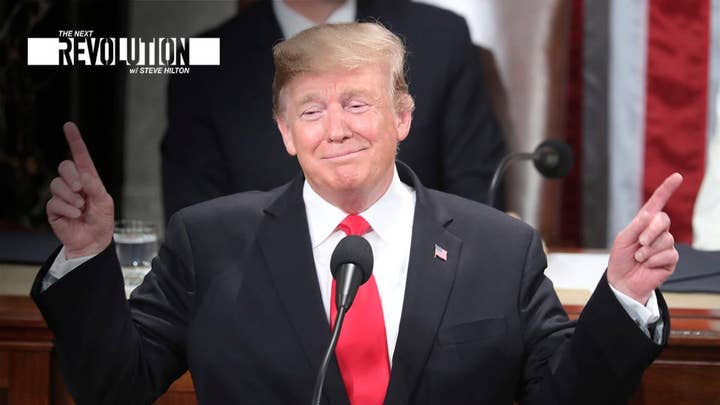Steve Says: The Democrat racism scandal in Virginia has rightly focused on the offensiveness of blackface
One of the things I’m most proud of in my professional life is an anti-racism campaign I helped create for Britain’s Commission for Racial Equality.
The Democratic racism scandal in Virginia has rightly focused on the offensiveness of blackface. But the blackface issue -- literally and politically -- is superficial. We need a deeper conversation.
I’ve always despised racism, and one of the things I’m most proud of in my professional life is an anti-racism campaign I helped create back in the UK. Obviously, I’m white. Even though I grew up in a working-class family of new immigrants from Hungary, I never suffered race-based discrimination. But I’ve always felt a bit of an outsider, perhaps with some empathy for victims of actual discrimination.
When I moved here seven years ago my attitude to race was shaped by that British experience of fighting current discrimination. Then I saw the depth of the anger and mistrust here. The intensity around identity and past oppression. Why are they still going on about it? What's this all about, I thought.
CLICK HERE TO READ MORE FROM STEVE HILTON
So, I tried to understand it. I educated myself, I asked questions, and I read the history. And that changed my attitude. Let me put it this way. A huge part of my political philosophy -- my hatred of government control and authoritarianism -- comes from what the Communists did to my family in Hungary. That was nothing compared to slavery. But I understand how anger about things that were done generations ago can shape someone’s beliefs today.
CLICK HERE TO VIEW THE ENTIRE EPISODE.
There’s another perspective I want to bring to all this: the populist perspective. Populism -- the positive kind -- is about putting power in people’s hands. Political power so their voices are heard but crucially economic power too so they can choose the life they want to lead.
For a while, I’ve wanted to say what I think about race in America -- as an immigrant, as an outsider -- and as a believer in positive populism. I know that what I’m going to say will be controversial. But I want you to listen with an open mind.
Race shouldn't be a left/right issue, but it often feels like that. Liberals can offend conservatives with strident identity politics. Conservatives can offend liberals by making race all about character: If only African-Americans tried harder, worked harder. Of course, character matters. Behavior matters. And family, most of all.
But many of the barriers African-Americans face today are uniquely the result of discriminatory policy -- from slavery to Jim Crow, to the New Deal, even. The biggest is wealth inequality.
The wealth of middle-class America was massively boosted by programs like the G.I. Bill, which paid for college education and policies to spread home ownership. These excluded black Americans -- by design.
The federal government subsidized around $120 billion in home loans between 1934 and 1962, through the homeowners' loan corporation and the federal housing administration. Ninety-eight percent of those loans went to white families.
Today, around two-thirds of middle-class wealth is held in home ownership. So unsurprisingly, white families are disproportionately wealthier than black ones. How much wealthier? Eighty-six times wealthier.
According to the Census Bureau, for every $100 the average white family has, the average black family has $7.33. But it's not just accumulated wealth. It's current earnings, too. At every level of income, African Americans earn less. The truth is self-evident: the persistent poverty and blocked opportunity of African-Americans is structural and specific. It is the result of policy and practice in areas like housing, education, criminal justice and more.
We will never, never, never achieve racial harmony in this country until we acknowledge these truths as the first step in a process of national reconciliation. I use all those words deliberately.
There are policies -- like school choice and support for families -- which we should want for every American but which can help African Americans even more. But it is this wealth inequality - the direct result of past discrimination - that needs special attention. A truth and reconciliation process, with due consideration of asset reparations -- that is the only way to heal our racial divide.
The Truth and Reconciliation Commission in post-apartheid South Africa. The First Step Act -- developed by both parties here, passed by Congress, championed by President Trump. But now we need many more steps. We need a truth and reconciliation process here. And it should explicitly consider dramatic action to close the wealth and opportunity gap. And not just a pledge to avoid discrimination, but reparation for the cruelty of the past.
Not by handing out checks. But asset reparations. Loans to buy homes and start businesses. Community banking and credit unions to free African Americans from the traps of debt and predatory lenders. Asset reparations.
CLICK HERE TO GET THE FOX NEWS APP
Of course, there are policies -- like school choice and support for families -- which we should want for every American but which can help African-Americans even more. But it is this wealth inequality - the direct result of past discrimination - that needs special attention. A truth and reconciliation process, with due consideration of asset reparations -- that is the only way to heal our racial divide.
The Republican Party, the party of Lincoln -- and now the party of Trump -- as it showed with the First Step Act -- can take the lead. I hope it does.
Adapted from Steve Hilton's monologue on "The Next Revolution" on February 10, 2019.


